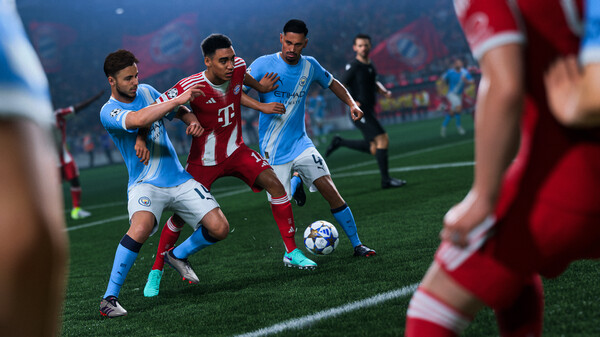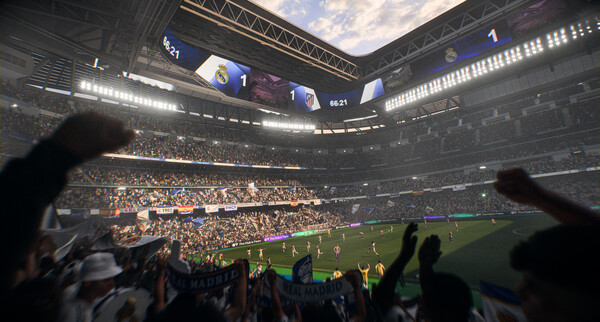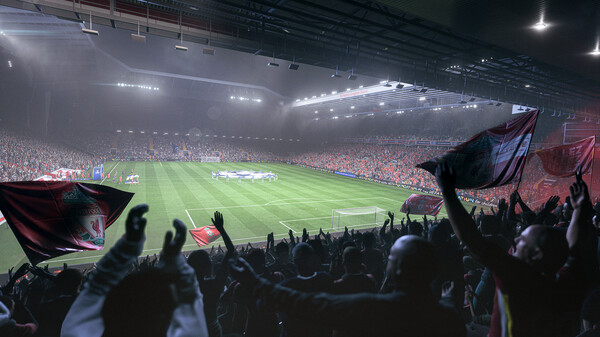Advertisement
Popular Now
EA SPORTS FC™ 26, the latest installment in EA’s long-standing football simulation franchise, has arrived with ambitious promises of refined gameplay, enhanced community feedback integration, and a more immersive football experience. With over 19,000 licensed players, 700 teams, and 35 leagues, the game aims to capture the essence of global football. However, despite these advancements, one issue continues to plague the series: online responsiveness. This critical aspect of gameplay, particularly in competitive modes like Ultimate Team and Clubs, has been a persistent pain point for players, impacting the fluidity and fairness of matches. This article delves deeply into the specific issue of online responsiveness in EA SPORTS FC™ 26, exploring its history, technical underpinnings, community feedback, and EA’s ongoing efforts to address it, while critically examining whether these efforts have truly delivered a solution.




The Historical Context of Responsiveness Issues

A Legacy of Lag
Online responsiveness has been a recurring complaint in the EA SPORTS FC series, dating back to its FIFA days. Players have long reported delays between input and in-game action, often described as “input lag” or “button delay.” These issues are particularly noticeable in online modes, where split-second decisions can determine the outcome of a match. In previous titles like FIFA 23 and EA SPORTS FC 24, players frequently cited sluggish controls, delayed passes, and unresponsive player movements, which diminished the competitive integrity of modes like Ultimate Team. These problems were often attributed to server performance, network latency, and the game’s netcode.Impact on Player Experience
The lack of responsiveness has tangible effects on gameplay. For instance, a delayed pass can result in an interception, while sluggish player switching can leave defenders out of position. In high-stakes scenarios, such as Division Rivals or FUT Champions, these delays can be the difference between victory and defeat. Community sentiment, as seen in forums like Reddit’s r/EASportsFC, reflects frustration with these issues, with players describing matches as feeling “clunky” or “unfair” due to inconsistent responsiveness. This historical context sets the stage for understanding why EA prioritized this issue in FC 26’s development cycle.EA’s Acknowledgment of the Problem
The FC Feedback Hub
In response to years of player complaints, EA introduced the FC Feedback Hub for EA SPORTS FC 26, a centralized platform for collecting and addressing community feedback. The hub includes a Player Feedback Portal, Discord channels, and EA Forums, all designed to facilitate direct communication between players and developers. In a July 2025 Pitch Notes update, EA explicitly acknowledged online responsiveness as a top priority, stating, “We’ve heard your feedback, and our teams have been working on making EA SPORTS FC 26 our most responsive title yet.” This marked a significant shift toward transparency, as EA detailed their efforts to tackle the issue head-on.Community-Driven Development
EA’s approach involved collaboration with FC Design Council members, FC Pro Players, and community representatives. For example, developers conducted in-person testing in Spain and the UK, visiting players’ homes and team headquarters to assess responsiveness on real-world setups. Remote testing also allowed EA to collect connection quality data globally. These efforts suggest a commitment to understanding the diverse network environments players operate in, from high-speed fiber connections to less reliable WiFi setups. However, the question remains whether these initiatives translated into meaningful improvements.Technical Factors Contributing to Responsiveness Issues
Network Latency and Ping
Online responsiveness in FC 26 hinges on network performance, particularly ping—the time it takes for data to travel between a player’s device and EA’s game servers. Lower ping results in faster, more responsive gameplay, while higher ping introduces delays. EA notes that ping is influenced by factors like internet service provider (ISP) routing and physical distance from game data centers, which can vary widely. For instance, a player in a rural area may experience higher ping than someone in an urban center, even with a fast connection. EA recommends using an ethernet cable over WiFi to reduce jitter and packet loss, which can exacerbate delays.Server Infrastructure Challenges
EA’s server infrastructure plays a critical role in responsiveness. The Frostbite engine, while powerful for rendering realistic visuals, places significant demands on server-client communication. In FC 26, EA claims to have optimized server performance, but community reports suggest mixed results. Posts on X indicate that server stability remains inconsistent, with some players experiencing smooth matches while others encounter lag spikes during peak hours. This variability points to challenges in scaling server capacity to handle millions of simultaneous players across global regions.Gameplay Modes Most Affected

Ultimate Team: The Competitive Crucible
Ultimate Team (FUT) is the most popular mode in FC 26, but it’s also where responsiveness issues are most pronounced. The mode’s competitive nature, with high-stakes matches in Division Rivals and FUT Champions, amplifies the impact of input lag. For example, a delayed tackle or shot can disrupt carefully planned strategies, leading to frustration. Players on Reddit have expressed disillusionment, with some stating they only play for rewards rather than enjoyment, citing responsiveness as a key factor. The removal of timed finishing in FC 26, intended to increase the skill gap, may exacerbate the issue if players cannot rely on precise inputs.Clubs and Co-Op Modes
Clubs, a mode where players create and manage their own teams, also suffers from responsiveness issues, particularly in co-op matches. The new Archetypes system, which allows for customized player attributes and perks, adds complexity to gameplay, requiring precise inputs to execute advanced maneuvers like shield trapping. However, lag can disrupt these mechanics, making it difficult to coordinate with teammates. Community feedback on Discord highlights that co-op modes feel “sluggish” when server performance falters, undermining the social and strategic elements of Clubs.EA’s Technical Improvements in FC 26
Reworked Gameplay Mechanics
EA has introduced several gameplay changes aimed at improving responsiveness. For instance, the shielding mechanic has been overhauled to provide more consistent ball control, with “Shield Trapping” allowing players to hold their ground against opponents. Additionally, goalkeeper reactions and ball physics have been refined to feel more fluid. These changes are designed to work in tandem with two gameplay presets: Competitive Gameplay for multiplayer modes and Authentic Gameplay for single-player modes. While these tweaks aim to reduce the impact of input lag, their effectiveness depends on stable server performance.Testing and Optimization Efforts
EA’s testing process for FC 26 included rigorous responsiveness checks. By working with a dedicated internal team and external players, EA collected data on connection quality and gameplay performance. This included stress-testing online modes to identify and address delay issues. For example, the nerfing of AI defending and the L1 speed boost glitch, as noted in X posts, suggests a focus on rewarding manual inputs, which could enhance the perception of responsiveness when executed correctly. However, these changes also raise the skill ceiling, potentially making lag more noticeable for less experienced players.Community Feedback and Sentiment
Mixed Reactions on Social Platforms
The community’s response to FC 26’s handling of responsiveness has been polarized. On X, some players, like @FutPoliceLeaks, praise the game as “the best since FIFA 18,” citing improvements like the nerfing of exploitative mechanics and a slower power curve. Others, however, remain skeptical, with comments on Reddit’s r/EASportsFC suggesting that server issues persist and updates often introduce new problems. For instance, one user noted that “even if the game is good at launch, EA will mess it up with updates,” reflecting distrust in EA’s ability to maintain stability.The Role of the Feedback Portal
The FC Feedback Portal has been lauded as a step forward, allowing players to submit structured feedback tied to in-game data. This system enables EA to prioritize issues like responsiveness based on player reports. However, some players argue that the portal’s structured format limits their ability to convey nuanced experiences, and the lack of immediate fixes for reported issues fuels frustration. The EA Forums and Discord channels also serve as outlets for feedback, but their effectiveness depends on EA’s ability to act swiftly on community input.The Competitive Gameplay Preset

Balancing Skill and Stability
The introduction of the Competitive Gameplay preset in FC 26 aims to cater to multiplayer modes by prioritizing responsiveness and precision. This preset reduces reliance on AI-driven mechanics, such as defending, and emphasizes manual control. For example, the nerfing of AI defending, as highlighted in X posts, rewards players who master manual tackling and interceptions. However, this shift places greater demands on server performance, as any lag can disproportionately affect players relying on precise inputs. Early feedback suggests that while the preset enhances the skill gap, it also exposes responsiveness flaws in high-pressure scenarios.Challenges in Implementation
Implementing the Competitive Gameplay preset across diverse network conditions is a significant challenge. Players with suboptimal connections—whether due to WiFi usage or ISP limitations—report inconsistent experiences. EA’s recommendation to use ethernet cables is practical but not universally feasible, particularly for casual players. Moreover, the preset’s focus on manual control may alienate players accustomed to AI assistance, potentially exacerbating the perceived impact of lag when it occurs.The Authentic Gameplay Preset
A Single-Player Sanctuary?
The Authentic Gameplay preset, designed for single-player modes like Career Mode, aims to deliver a more immersive and realistic football experience. By prioritizing fluid animations and realistic ball physics, this preset is less dependent on online responsiveness. However, some players report that even single-player modes can feel sluggish due to underlying engine issues, particularly when transitioning between menus and gameplay. The Frostbite engine’s complexity may contribute to these issues, as it struggles to maintain consistent performance across different hardware configurations.Limitations in Offline Modes
While the Authentic preset is less affected by server issues, it’s not immune to responsiveness problems. For instance, menu navigation in Career Mode has been criticized for being laggy, a longstanding issue that EA addressed in FC 25 but hasn’t fully resolved in FC 26. Players on Reddit have noted that the improved menu speed promised in FC 26 falls short during peak usage times, suggesting that engine-level optimizations are still needed to ensure a seamless experience.The Role of Player Expectations
The Burden of Annual Releases
The annual release cycle of EA SPORTS FC places immense pressure on developers to deliver significant improvements while maintaining stability. Players expect each iteration to address longstanding issues like responsiveness, but the incremental nature of updates often leads to disappointment. Reddit threads from r/EASportsFC highlight a growing sentiment that FC 26, despite its improvements, feels like a “glorified reskin” of FC 25. This perception is compounded by the high expectations set by EA’s marketing, which touts FC 26 as a revolutionary step forward.The Gambling Analogy
Some players compare their engagement with FC 26 to gambling, driven by the pursuit of rewards rather than genuine enjoyment. This is particularly evident in Ultimate Team, where the grind for better players overshadows gameplay issues like responsiveness. Comments on Reddit suggest that players continue to invest time in the game out of habit or compulsion, even when lag undermines their experience. This dynamic underscores the challenge EA faces in balancing engagement mechanics with technical stability.EA’s Future Roadmap for Responsiveness


















